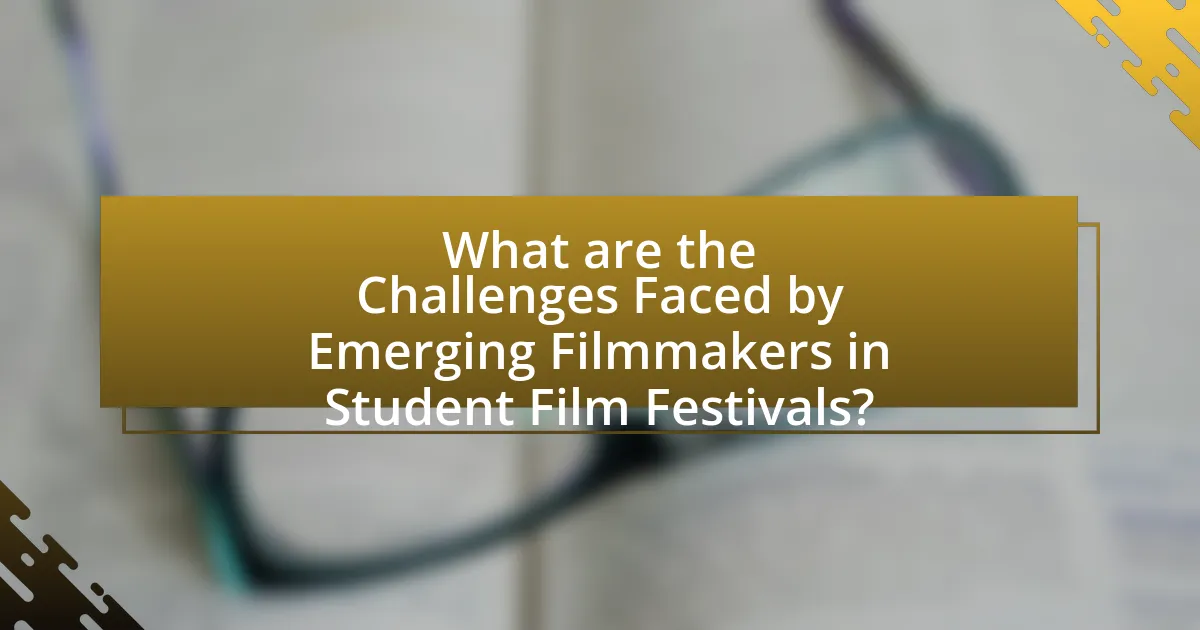Student Film Festivals are specialized events that showcase films created by students, aiming to promote creativity, artistic expression, and networking opportunities within the film industry. These festivals differ from traditional film festivals by focusing on emerging talent rather than established filmmakers, emphasizing educational experiences and innovative storytelling. The selection of films is based on criteria such as originality, storytelling quality, and technical execution, while participation in these festivals supports students’ educational goals and career advancement. Additionally, student film festivals provide vital networking opportunities and recognition that can significantly impact the future careers of emerging filmmakers.

What are Student Film Festivals and Their Purpose?
Student Film Festivals are events specifically designed to showcase films created by students, providing a platform for emerging filmmakers to present their work. The primary purpose of these festivals is to promote creativity, encourage artistic expression, and facilitate networking opportunities among students, industry professionals, and audiences. By featuring student films, these festivals help to highlight new talent and innovative storytelling techniques, often leading to recognition and career advancement for participants. For instance, festivals like the Cannes Film Festival have dedicated sections for student films, illustrating their significance in the broader film industry.
How do Student Film Festivals differ from traditional film festivals?
Student Film Festivals primarily differ from traditional film festivals in their focus on showcasing the work of emerging filmmakers, often students, rather than established industry professionals. These festivals typically emphasize educational experiences, providing a platform for students to gain exposure, receive feedback, and network within the film community. In contrast, traditional film festivals often feature films from seasoned filmmakers and established studios, prioritizing commercial viability and broader audience appeal. This distinction highlights the role of student festivals in nurturing new talent and fostering innovation in filmmaking, as they often prioritize creativity and experimentation over market-driven content.
What criteria are used to select films for student festivals?
Films for student festivals are selected based on criteria such as originality, storytelling quality, technical execution, and relevance to the festival’s theme. Originality assesses the uniqueness of the film’s concept and approach, while storytelling quality evaluates the narrative structure and emotional impact. Technical execution considers aspects like cinematography, sound design, and editing. Relevance to the festival’s theme ensures that the film aligns with the specific focus or message the festival aims to convey. These criteria help showcase emerging talent by highlighting innovative and compelling works that resonate with audiences and industry professionals.
How do these festivals support the educational goals of students?
Student film festivals support the educational goals of students by providing a platform for practical learning and skill development in filmmaking. These festivals encourage students to engage in the entire filmmaking process, from scriptwriting to production and editing, thereby enhancing their technical and creative abilities. Research indicates that participation in such festivals fosters critical thinking and collaboration, as students often work in teams to produce their films. Additionally, exposure to diverse perspectives and feedback from industry professionals at these events helps students refine their work and gain insights into the film industry, aligning with educational objectives of experiential learning and professional development.
Why are Student Film Festivals important for emerging talent?
Student Film Festivals are crucial for emerging talent as they provide a platform for young filmmakers to showcase their work to industry professionals and peers. These festivals often attract influential judges, producers, and distributors, creating networking opportunities that can lead to career advancements. For instance, many successful filmmakers, such as Spike Lee and Ava DuVernay, gained recognition through student film festivals, illustrating their role in launching careers. Additionally, participation in these festivals allows emerging talent to receive feedback and recognition, which is essential for artistic growth and development.
What opportunities do these festivals provide for networking?
Student film festivals provide significant networking opportunities by connecting emerging filmmakers with industry professionals, peers, and potential collaborators. These events often feature panels, workshops, and Q&A sessions where participants can engage directly with established figures in the film industry, facilitating valuable relationships. Additionally, the informal settings of screenings and social events allow attendees to share ideas, discuss projects, and explore partnerships. According to a study by the University of Southern California, 70% of filmmakers reported that networking at festivals led to future collaborations, highlighting the effectiveness of these events in fostering professional connections.
How do festivals help in showcasing diverse voices in film?
Festivals help in showcasing diverse voices in film by providing a platform for underrepresented filmmakers to present their work to a wider audience. These events often prioritize inclusivity, featuring films from various cultural, social, and gender backgrounds, which allows for a richer narrative landscape. For instance, festivals like Sundance and Tribeca have dedicated sections for films by women and filmmakers of color, highlighting the importance of diverse perspectives in storytelling. This commitment to diversity not only amplifies marginalized voices but also fosters dialogue and understanding among audiences, as evidenced by the increasing number of awards and recognition given to films that explore varied human experiences.

How do Student Film Festivals Showcase Emerging Talent?
Student film festivals showcase emerging talent by providing a platform for students to present their films to a wider audience, including industry professionals and peers. These festivals often feature competitive screenings, workshops, and networking opportunities that allow students to gain exposure and receive feedback on their work. For instance, festivals like the Sundance Film Festival and the Cannes Film Festival have dedicated sections for student films, highlighting the importance of nurturing new voices in cinema. Additionally, many festivals offer awards and scholarships, further incentivizing participation and recognizing outstanding talent. This structured environment fosters creativity and innovation, essential for the growth of emerging filmmakers.
What platforms do these festivals provide for student filmmakers?
Student film festivals provide platforms such as screening events, workshops, and networking opportunities for student filmmakers. These festivals allow students to showcase their work to industry professionals and peers, facilitating exposure and potential career advancement. For instance, festivals like Sundance and Cannes have dedicated categories for student films, enabling participants to gain recognition and feedback from established filmmakers and audiences. Additionally, many festivals offer mentorship programs and panels that further support the development of emerging talent in the film industry.
How do screenings at festivals impact a filmmaker’s career?
Screenings at festivals significantly enhance a filmmaker’s career by providing exposure, networking opportunities, and potential distribution deals. These events allow filmmakers to showcase their work to industry professionals, critics, and audiences, which can lead to increased visibility and recognition. For instance, films that gain awards or positive reviews at festivals often attract the attention of distributors, as evidenced by the success of films like “The Blair Witch Project,” which gained traction after its festival screenings. Additionally, networking at these festivals can lead to collaborations and mentorship opportunities, further advancing a filmmaker’s career trajectory.
What role do judges and industry professionals play in these festivals?
Judges and industry professionals play a critical role in student film festivals by evaluating submissions, providing feedback, and offering networking opportunities. Their expertise helps to assess the quality of films, ensuring that outstanding work is recognized and rewarded. For instance, judges often include experienced filmmakers, critics, and educators who can provide valuable insights that enhance the learning experience for student filmmakers. Additionally, industry professionals may conduct workshops or panels, sharing knowledge about the film industry and helping students understand the pathways to success. This interaction not only validates the students’ work but also connects them with potential mentors and collaborators, fostering their growth in the film industry.
How do awards and recognition at festivals influence emerging talent?
Awards and recognition at festivals significantly enhance the visibility and credibility of emerging talent. When filmmakers receive accolades, they gain access to industry networks, increased opportunities for funding, and potential distribution deals. For instance, a study by the University of Southern California found that films awarded at festivals often see a 50% increase in distribution offers compared to those that are not recognized. This recognition not only validates the talent’s work but also attracts attention from producers and investors, facilitating career advancement in a competitive industry.
What types of awards are typically given at student film festivals?
Student film festivals typically award categories such as Best Film, Best Director, Best Screenplay, Best Cinematography, and Audience Choice Award. These awards recognize excellence in various aspects of filmmaking, encouraging creativity and skill among emerging filmmakers. For instance, the Best Film award often highlights the overall quality and impact of a student project, while the Audience Choice Award reflects the preferences of festival attendees, showcasing popular appeal.
How can winning an award affect a student’s future opportunities?
Winning an award can significantly enhance a student’s future opportunities by providing recognition and credibility in their field. This recognition often leads to increased visibility among industry professionals, which can result in internships, job offers, and networking opportunities. For instance, a study by the National Association of Colleges and Employers found that students with awards on their resumes are 20% more likely to receive job interviews compared to those without. Additionally, awards can bolster a student’s confidence and motivation, encouraging them to pursue further education or creative projects, thereby expanding their career prospects in competitive industries like film and media.

What are the Challenges Faced by Emerging Filmmakers in Student Film Festivals?
Emerging filmmakers in student film festivals face several challenges, including limited funding, lack of industry connections, and competition from more experienced peers. Limited funding restricts their ability to produce high-quality films, as many rely on personal finances or small grants. The lack of industry connections makes it difficult for them to gain exposure and mentorship opportunities, which are crucial for career advancement. Additionally, competition from more experienced filmmakers can overshadow their work, making it harder for their films to be recognized and appreciated. These challenges highlight the barriers that emerging filmmakers must navigate to succeed in the competitive environment of student film festivals.
What common obstacles do student filmmakers encounter?
Student filmmakers commonly encounter obstacles such as limited budgets, lack of access to professional equipment, and insufficient experience in filmmaking techniques. Limited budgets restrict their ability to hire skilled crew members or rent high-quality gear, which can compromise the production value of their projects. Additionally, many student filmmakers do not have access to professional-grade equipment, which can hinder their ability to create visually compelling films. Furthermore, the lack of experience in areas such as scriptwriting, directing, and editing can lead to challenges in executing their creative vision effectively. These obstacles are prevalent in the student filmmaking community, impacting the overall quality and feasibility of their projects.
How can limited budgets affect film production for students?
Limited budgets significantly constrain film production for students by limiting access to essential resources such as equipment, locations, and professional talent. These financial restrictions often force students to rely on low-cost or borrowed equipment, which can compromise the technical quality of their films. Additionally, limited funds may restrict the number of shooting days or the ability to hire skilled crew members, resulting in a less polished final product. Research indicates that student filmmakers often report that budget constraints lead to creative compromises, such as simplified scripts or reduced production values, which can hinder their ability to fully realize their artistic vision.
What strategies can students use to overcome these challenges?
Students can overcome challenges in film festivals by leveraging collaboration, seeking mentorship, and utilizing technology. Collaboration allows students to pool resources and skills, enhancing the quality of their projects. For instance, working in teams can lead to diverse perspectives and innovative ideas, which are crucial in creative fields. Seeking mentorship from experienced filmmakers provides guidance and industry insights, helping students navigate the complexities of film production. Additionally, utilizing technology, such as editing software and online platforms for distribution, enables students to produce high-quality films and reach wider audiences. These strategies are supported by the increasing number of successful student films that have gained recognition at festivals, demonstrating the effectiveness of collaboration, mentorship, and technology in overcoming challenges.
How can students maximize their experience at film festivals?
Students can maximize their experience at film festivals by actively engaging in networking opportunities, attending workshops, and participating in Q&A sessions with filmmakers. Engaging with industry professionals and peers can lead to valuable connections that may benefit their future careers. Workshops often provide insights into the filmmaking process, enhancing students’ understanding of the craft. Additionally, Q&A sessions allow students to gain perspectives directly from filmmakers, fostering a deeper appreciation for the films presented. Research indicates that networking is crucial in the film industry, as many opportunities arise from personal connections made at events like film festivals.
What tips can help students prepare for their festival submissions?
Students can prepare for their festival submissions by thoroughly understanding the submission guidelines and deadlines. Familiarizing themselves with the specific requirements of each festival ensures that their work meets the necessary criteria, which can include format specifications, runtime limits, and content restrictions. Additionally, students should focus on refining their projects through multiple rounds of feedback from peers and mentors, as constructive criticism can significantly enhance the quality of their submissions. Engaging in workshops or seminars related to filmmaking can also provide valuable insights and skills that improve their work. Lastly, students should ensure that their promotional materials, such as synopses and bios, are polished and professional, as these elements can influence the selection committee’s perception of their project.
How can networking at festivals lead to future collaborations?
Networking at festivals can lead to future collaborations by facilitating direct interactions between filmmakers, industry professionals, and potential collaborators. These events create an environment where individuals can share ideas, discuss projects, and establish relationships that may result in joint ventures. For instance, a study by the University of Southern California found that 70% of filmmakers reported that networking at festivals significantly contributed to their ability to secure future projects and partnerships. This statistic underscores the importance of face-to-face connections in the creative industry, as personal relationships often lead to collaborative opportunities that might not arise through traditional channels.
What are the best practices for participating in Student Film Festivals?
The best practices for participating in Student Film Festivals include thorough research on festival guidelines, crafting a compelling narrative, and ensuring high production quality. Researching festival guidelines helps filmmakers understand submission requirements, deadlines, and eligibility criteria, which can significantly impact acceptance rates. Crafting a compelling narrative is crucial, as storytelling is a key element that judges evaluate; films that resonate emotionally or present unique perspectives tend to stand out. High production quality, including clear audio and visuals, enhances the viewing experience and reflects professionalism, which is often a deciding factor in festival selections. According to a study by the University of Southern California, films with strong narratives and technical quality have a higher likelihood of winning awards at festivals, reinforcing the importance of these practices.
How should students approach the festival application process?
Students should approach the festival application process by thoroughly researching each festival’s specific requirements and guidelines. This involves understanding submission deadlines, eligibility criteria, and the types of films accepted, which can vary significantly between festivals. For instance, the Sundance Film Festival emphasizes innovative storytelling and diverse voices, while other festivals may focus on specific genres or themes. By aligning their submissions with the festival’s mission and audience, students increase their chances of selection. Additionally, students should prepare a polished application package that includes a well-crafted film, a compelling synopsis, and any required promotional materials, as these elements are critical in making a strong impression on festival juries.
What resources are available to help students succeed in festivals?
Students can access various resources to succeed in festivals, including mentorship programs, workshops, and funding opportunities. Mentorship programs connect students with industry professionals who provide guidance on filmmaking techniques and festival strategies. Workshops often cover essential skills such as scriptwriting, editing, and marketing, enhancing students’ abilities to create compelling films. Additionally, many festivals offer grants or scholarships to support student filmmakers financially, enabling them to focus on their projects without financial strain. These resources collectively empower students to navigate the festival landscape effectively and showcase their talent.

Leave a Reply